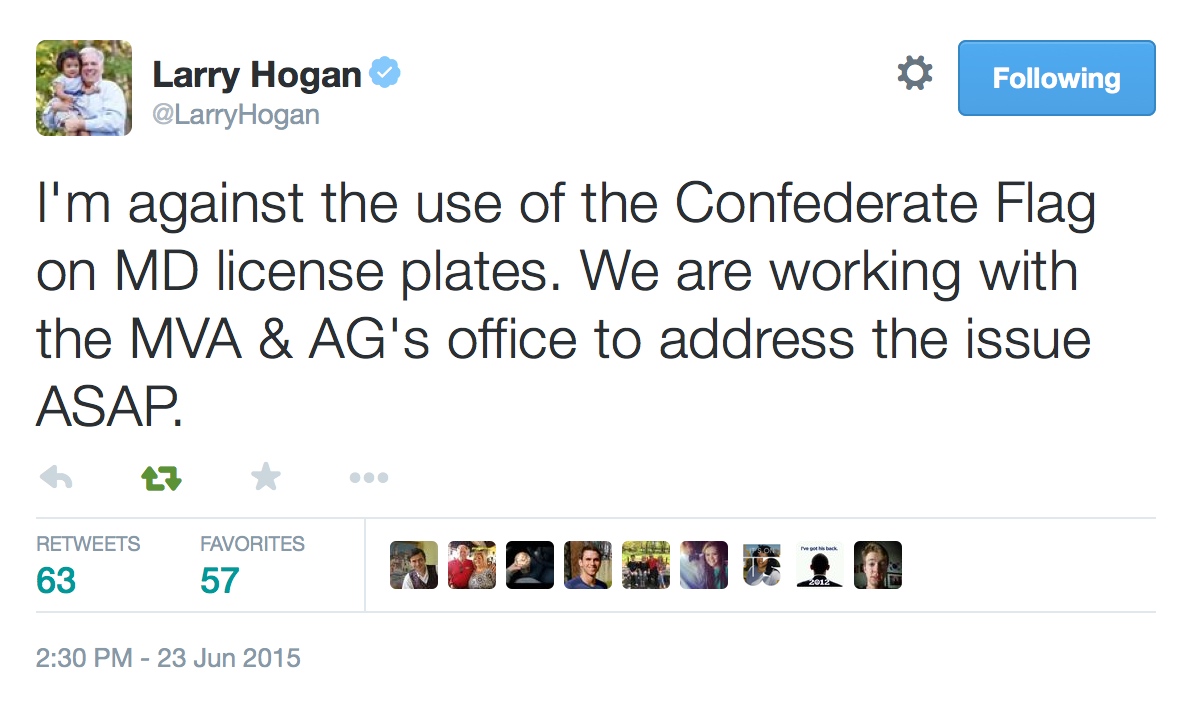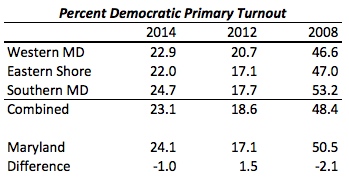Letter from Forty-Two State Legislators
June 23, 2015
Secretary Pete Rahn
Maryland Department of Transportation
Office of the Secretary
7201 Corporate Center Drive
P.O. Box 548
Hanover, MD. 21076
Milton Chaffee
Motor Vehicle Administrator
6601 Ritchie Highway NE
Glen Burnie, MD 21062
Dear Secretary Rahn and Administrator Chaffee:
As you know, the Supreme Court held last week in Walker v. Sons of Confederate Veterans that states can exclude the Confederate flag from government specialty license plate programs. Consequently, we request that you use your authority to reinstate Maryland’s previous policy of not including the Confederate battle flag in specialty license plate designs.
The Supreme Court determined that these programs reflect expressions of government speech and therefore do not constitute an open forum for private speech within the meaning of the First Amendment. Our high court has thus transformed the meaning of messages contained in our specialty license plates into Maryland government speech, and these plates now inevitably carry the imprimatur and symbolic prestige of our state government and our people.
Given this understanding, we should not include the Confederate battle flag—the nation’s leading symbol of secession, armed rebellion against the U.S. government, slavery and racism–in our specialty license plate program. To be sure, every symbol has multiple connotations, and not everyone who displays the flag means the same thing by it. But there is no doubt that for millions of Marylanders, the Confederate battle flag’s meaning is reasonably and uniquely identified with the history of slavery, white supremacy, and racial violence. In the 20th century, after Brown v. Board of Education was decided, the flag was resurrected as a symbol of Jim Crow segregation and violent opposition to the Civil Rights Movement.
The policy question of whether to issue Confederate flag plates arose in Maryland in 1996. Back then the Motor Vehicles Administration decided to recall Maryland license plates that had been issued with Confederate flags on them. This action was struck down by the Fourth Circuit Court of Appeals on free speech grounds in a decision now effectively overruled by the Supreme Court. We therefore urge you to work with the MVA to reinstate its former policy on this issue and exclude the use of the Confederate insignia on state license plates.
We hope that you will undertake a prompt review of the situation and conclude that the state of Maryland has both the legal authority and a clear reason to disassociate ourselves from a symbol that may reasonably be regarded as a “badge and incident” of slavery within the meaning of the Thirteenth Amendment.
Sincerely,
Senator Jamie Raskin
Senator Catherine Pugh
Senator Susan Lee
Senator Cheryl Kagan
Senator Nathaniel McFadden
Senator Rich Madaleno
Senator Karen Montgomery
Senator Paul Pinsky
Senator Victor Ramirez
Delegate Barbara Robinson
Delegate Vanessa Atterbeary
Delegate Erek Barron
Delegate Pam Beidle
Delegate Al Carr
Delegate Luke Clippinger
Delegate David Fraser-Hidalgo
Delegate Bill Frick
Delegate Ana Sol Gutierrez
Delegate Shelly Hettleman
Delegate Sheila Hixson
Delegate Anne Kaiser
Delegate Tony Knotts
Delegate Marc Korman
Delegate Ben Kramer
Delegate Karen Lewis Young
Delegate Brooke Lierman
Delegate Eric Luedtke
Delegate David Moon
Delegate Shane Pendergrass
Delegate Andrew Platt
Delegate Kirill Reznik
Delegate Sandy Rosenberg
Delegate Sheree Sample-Hughes
Delegate Will Smith
Delegate Dana Stein
Delegate Charles Sydnor III
Delegate Jimmy Tarlau
Delegate Kris Valderamma
Delegate Jeff Waldstreicher
Delegate Alonzo Washington
Delegate Mary Washington
Delegate Craig Zucker
Letter from Sen. Jamie Raskin and Del. David Moon
June 22, 2015
Brian Frosh, Attorney General
Office of the Attorney General
200 St. Paul Place, Baltimore, MD 21202
Dear Attorney General Frosh:
We hereby request an opinion from the Office of the Attorney General on whether the Maryland Motor Vehicle Administration (MVA) can, without legislation, exclude the Confederate flag from specialty license plate designs.
This week the United States Supreme Court held in Walker v. Sons of Confederate Veterans that Texas can exclude the Confederate flag from its government license plate programs. In 1996, the Maryland MVA similarly decided to recall Maryland license plates that had been issued with Confederate flags on them, but this action was struck down by the Fourth Circuit Court of Appeals. This decision has now been effectively overruled by the Supreme Court.
We therefore seek your confirmation that the MVA may now take steps to recall previously issued license plates with the Confederate flag and may exclude the Confederate flag from future specialty license plate designs.
Very truly yours,
Jamie Raskin
Senator, District 20
David Moon
Delegate, District 20





